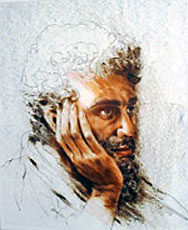



�Protagoras (ca. 490Ð 420 BC) was a pre-Socratic Greek philosopher and is numbered as one of the sophists by Plato. In his dialogue Protagoras, Plato credits him with having invented the role of the professional sophist or teacher of virtue
Protagoras was born in Abdera, Thrace, in Ancient Greece. "In Plato's Protagoras, before the company of Socrates, Prodicus, and Hippias, he states that he is old enough to be the father of any of them. This suggests a date of not later than 490 B.C."
In the Meno (91e) he is said to have died at about the age of seventy after forty years as a practicing Sophist. His death, then, may be assumed to have occurred circa 420." He was well-known in Athens and became a friend of Pericles. Plutarch relates a story in which the two spend a whole day discussing an interesting point of legal responsibility, that probably involved a more philosophical question of causation. "In an athletic contest a man had been accidentally hit and killed with a javelin. Was his death to be attributed to the javelin itself, to the man who threw it, or to the authorities responsible for the conduct of the games?"
Protagoras was also renowned as a teacher who addressed subjects connected to virtue and political life. He was especially involved in the question of whether virtue could be taught, a commonplace issue of 5th Century B.C. Greece (and related to modern readers through Plato's dialogue).
Rather than educators who offered specific, practical training in rhetoric and public speaking, Protagoras attempted to formulate a reasoned understanding, on a very general level, of a wide range of human phenomena (for example, language and education). He also seems to have had an interest in orthoepeia, or the correct use of words (a topic more strongly associated with his fellow-sophist Prodicus).
His most famous saying is: "Man is the measure of all things: of things which are, that they are, and of things which are not, that they are not" Like many fragments of the Presocratics, this phrase has been passed down to us without any context, and its meaning is open to interpretation. Plato ascribes relativism to Protagoras and uses his predecessor's teachings as a foil for his own commitment to objective and transcendent realities and values. Plato also ascribes to Protagoras an early form of phenomenology, in which what is or appears for a single individual is true or real for that individual.
Protagoras was also a famous proponent of agnosticism. In his lost work, On the Gods, he wrote: "Concerning the gods, I have no means of knowing whether they exist or not or of what sort they may be, because of the obscurity of the subject, and the brevity of human life" (80B4 DK).
Very few fragments from Protagoras have survived, though he is known to have written several different works: Antilogiae and Truth. The latter is cited by Plato, and was known alternatively as 'The Throws' (a wrestling term referring to the attempt to floor an opponent). It began with the "man the measure" pronouncement.
The Protagoras crater on the Moon was named in his honor.
Protagoras and the scientific method
Even though Protagoras was a contemporary of Socrates, the philosopher of Abdera is considered a presocratic thinker. He followed the Ionian tradition that distinguishes the School of Abdera. The distinctive note of this tradition is criticism, a systematic discussion that can be identified as "presocratic dialectic", an alternative to the Aristotelian demonstrative method which, according to Karl Popper, has the fault of being dogmatic. The main contribution of Protagoras was perhaps his method of finding a better argument by discarding the less viable one. This is known as "Antilogies", and consists of two premises; the first is "Before any uncertainty two opposite theses can validly be confronted", the second is its complement: the need to "strengthen the weaker argument".
Protagoras knew that the less appealing argument could hide the best answer, which is why he stated that it was constantly necessary to strengthen the weakest argument. Having been born before Socrates himself, this progressive viewpoint in the development of consensual truth could conceivably have contributed to the progressive styles of many of the other great minds which followed him. His most recent defender is Joseph Margolis, especially in the latter's The Truth About Relativism (Blackwell's, 1991).
Protagoras Dialogue
Protagoras is the title of one of Plato's dialogues.The title refers to the main character Protagoras, a philosopher who belonged to the Sophists. In this dialogue, Plato places himself in opposition to the Sophists and their style of philosophical inquiry, which he believes favors disingenuous word games over substantive and earnest thought.The work consists of a discussion between Socrates and Protagoras, mainly dealing with the teachability of arete, or virtue. Protagoras argues that society is capable of instilling a sense of justice in the individual. This is achieved through instruction (as in schools) or punishment (as in prisons). He further argues that if an individual is aware of what is good and what is bad, they will never commit evil.
Plato tries to show that this is an overly simplistic notion, first by demonstrating the difficultly of defining arete and isolating it from similar, but not identical notions such as "courage" or "wisdom", and secondly by getting Protagoras to admit that people sometimes willingly commit bad or evil acts even if they are aware that they are wrong. He also advances an idea similar to Jeremy Bentham's Principle of Utility, arguing that true wisdom is the ability to accurately determine which actions will produce the greatest pleasure and the least pain and to act accordingly. Plato concludes that people commit evil acts because they lack the wisdom to assess their impact accurately.Ultimately, Plato and Protagoras agree that arete is a form of knowledge or wisdom which is therefore capable of being taught, although they are in substantial disagreement about how to go about doing so. Protagoras